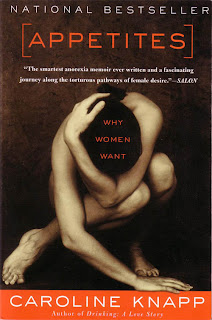
Ever since I first discovered Caroline Knapp I've enjoyed reading anything she's written. This is a book that is basically her anorexia memoir, but it's more like an set of essays or reflective pieces about her experience with anorexia and her thoughts about the larger issue of physical and emotional appetites and how women indulge or deny them.
I thought this was a lot different than anything else I've ever read about anorexia or eating disorders. Knapp was struggling with anorexia in the early 80s and has a lot to say about how the political and social climate in the US at that time influenced her life back then. It was a time when feminism was seeing a backlash after it's huge heyday in the 60s and 70s. At this time, in the 80s, women were told that they could have it all, think big, be ambitious. Feminism had ostensibly leveled the playing field, but insidious undercurrents were there. While women were supposed to get bigger and bigger in their careers and ambitions, there was an enormous cultural push for women to be smaller and smaller physically. Inordinate worth was placed upon a woman's ability to be thin.
The book gives a lot to think about. Knapp does not propose that the main cause of anorexia is society's skewed views of women's bodies. To her this is a huge influence, but not the be all end all reason. At the heart of her compulsion to starve was a complex tangle of feelings about being a young woman, unsure of what she was supposed to do with her life, of how to realize all these new dreams that were open to women. Knapp proposes that women never really gained the freedom to acknowledge, experience, pursue, and understand their appetites fully. The push from society is to repress the appetite, to make yourself smaller. The concept of appetites is broadly framed. She addresses hunger for food, for sexual pleasure, for love from family and partners, for career advancement and professional success. She suggests that some women suffer from eating disorders, compulsive shopping, cutting, and other issues because of our problematic relationships to our own appetites in all these areas. Society does not truly support women being hungry for these things and so we find outlets that help us to repress or deflect our appetites we feel we're not supposed to have--we overeat, we starve, we purge, we cut, we steal, we drink. All to help us not feel the giant hunger for love and recognition as equals that is yet unfulfilled.
I really think this book was worth reading. You can read it quickly and feel like you're just rushing through it, but the ideas she puts forth really stuck with me.
 Lucky is a thoughtful 10 year old girl that has seen a lot of tragedy in her short life. Her mother died two years ago and she has a father who sends money has never had the urge to meet her. Lucky's guardian is Brigitte, her father's other ex-wife, and Lucky is scared that one day she'll have enough of life in their tiny desert town and move back to Paris.
Lucky is a thoughtful 10 year old girl that has seen a lot of tragedy in her short life. Her mother died two years ago and she has a father who sends money has never had the urge to meet her. Lucky's guardian is Brigitte, her father's other ex-wife, and Lucky is scared that one day she'll have enough of life in their tiny desert town and move back to Paris.

